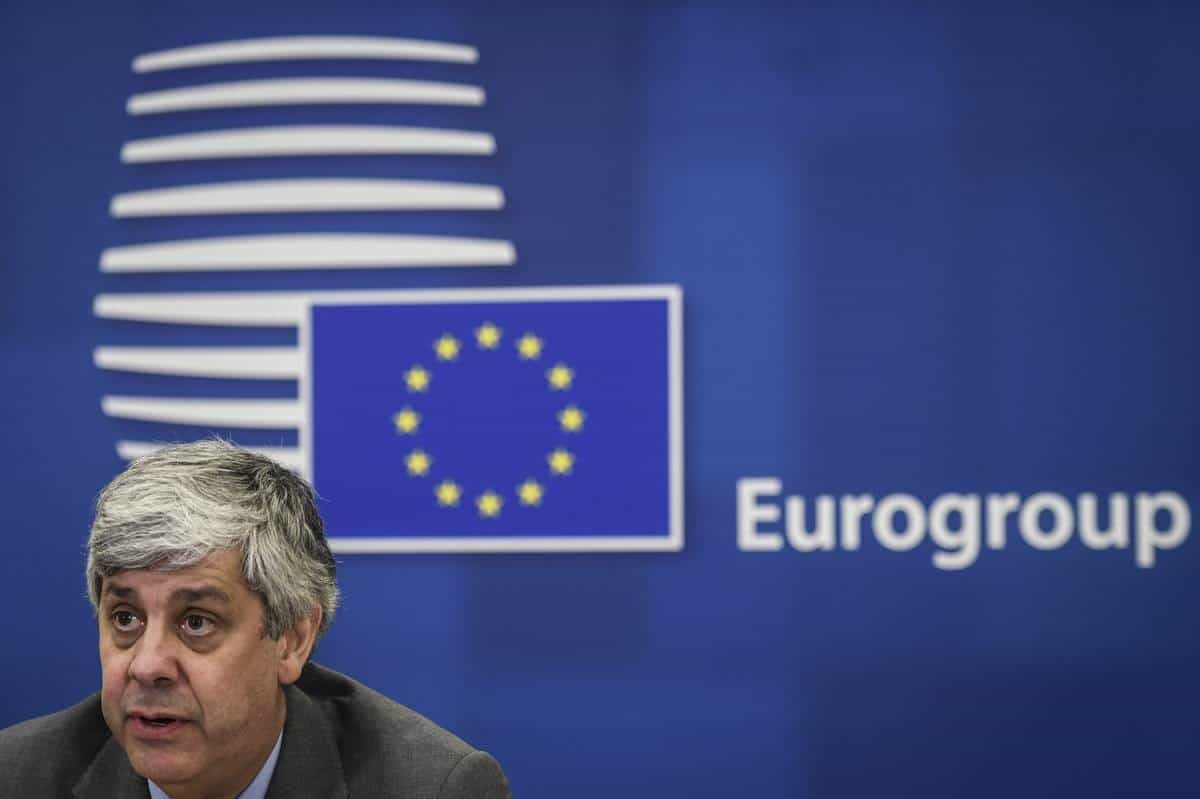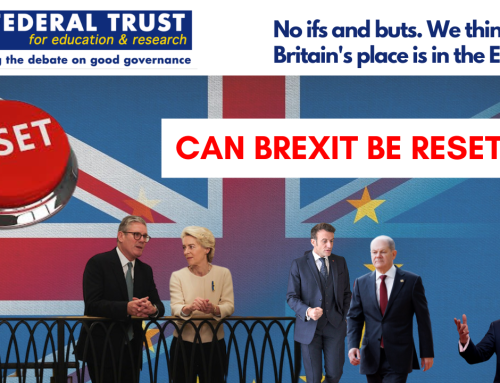Eurogroup President Mario Centeno at the Eurogroup video conference on 9th April. Photo credit: European Union

by Dr Andrew Black
Senior Research Fellow at Global Policy Institute; Senior Research Fellow, Brunel Business School
17th April 2020
What I see is European construction drifting towards a free-trade zone, that is to say an English-style Europe, which I reject. If we do nothing, this will lead in 15 years to a break-up. I reject a Europe that would be just a market, a free-trade zone without a soul, without a conscience, without political will, without a social dimension.
Jacques Delors Interview (c. 16/17 October 1993), quoted in The Times (19 October 1993), p. 11
It is a curious thought that while Britain has opted to leave the EU, so it has managed to infect the EU with its own free market virus. A virus that Jacques Delors thought would lead to the collapse of the EU by 2008 – the year of the Great Financial Crisis (GFC). The EU, and more particularly the Eurozone, survived that crisis, only to limp on into the next one, caused by the Covid-19 virus.
As the various countries in the Eurozone (EZ) moved into lockdown mode, so they enacted a variety of national measures designed to alleviate the economic pain caused by Covid-19. A rapid survey of existing measures revealed that the sum total of designated fiscal measures to prop up the economy (including Germany, France, Italy, Spain and the Netherlands) amounts to around € 500 billion. This represents the addition of those measures announced as having some kind of financial ceiling. Most of these countries have also entered into what are open ended and in some cases unlimited commitments to subsidize the cost of wages and salaries, both for larger companies as well as for SMEs and for the self employed. These could amount to a similar total, suggesting that combined support on offer by EZ countries could be in the region of € 1 trillion. Before thinking that this looks like a generous sum, consider that the USA (federal government) has currently offered US$ 2.8 trillion (€ 2.57 trillion) to support personal incomes and company liquidity through the Covid-19 crisis. This is wrapped into a single piece of legislation, called the Coronavirus Aid, Relief and Economic Security Act, or CARES for short. This was passed on March 27th with bipartisan support by Congress, and shows that federations can act swiftly when needed.
Managing Covid-19 the EZ way
The EU/EZ is not known for rapid decision making, and the confederation does not generally react well in crises, as will be shown below. After long meetings and considerable disagreements, the Eurozone finance ministers achieved a compromise/consensus for an emergency rescue package on April 9th 2020. While this succeeded in creating some fiscal space for member states to gain some financial support for dealing with Covid-19, the negotiations were conducted in a mean spirited way, with continuing deep disagreements about the future. Moreover, the scope of the measures was largely limited to supporting medical emergencies, leaving measures to deal with Covid-19’s economic consequences to another day.
A €500 million package of ‘palliative economic measures” has been assembled, involving revised credit lines from the European Stability Mechanism (ESM), set up after the GFC. These credit lines will be available two weeks following the agreement. They will be accompanied by increased European Investment Bank (EIB) lending. This involves €25 billion, designed to create loans to SMEs in the Eurozone. This, it was argued, can be leveraged up to €200 billion.
It was also agreed that member states facing difficulties can spend up to 2% of GDP from the ESM, without there being any conditionality being applied. Woe betide any member state that might be tempted to spend these funds on anything other than health related items. Since, according to the Dutch Finance Minister, Wopke Hoekstra, the debtor would have to undertake reforms after the crisis and pay back these monies to the ESM.
All of which is highly reminiscent of earlier difficulties with the Greek financial crisis, and circumstances back in 2012 when the PIIGS (Portugal, Ireland Italy, Greece and Spain) were obliged to accept, to them, humiliating conditions in order to gain any support from the EZ at all. The patent distrust shown by mainly northern EZ members towards their southern partners being such as to make outsiders wonder how long the EZ could realistically remain together.
The Covid crisis provided a reminder of an even earlier debate around the issue of Eurobonds, something backed by the ECB. These were proposed by advisors from the German Economic Council, as well as in a paper called “A Modest Proposal” by Holland, Varoufakis and Galbraith (2012), pointing out that mutual debt instruments issued by the EZ as part of a more integrated monetary bloc would be a good way to resolve the sovereign debt crisis, by effectively reducing the debt refinancing costs of heavily indebted member states. The Covid crisis led to a proposal, backed by 9 EZ member states, for Corona bonds, following along similar principles. These would be issued and backed by the EZ, with the ECB managing the secondary market. And just to show how little was learned from the earlier crisis, the northern creditor nations, mainly the Netherlands and Germany, again refused to countenance their introduction, thus jeopardizing the foundation of a European Recovery Fund. No agreement was reached about how large should the fund be, when should it be set up (was it urgent or not?), and neither was there agreement on how the funding costs should be shared between the fiscally stronger and weaker member states.
The peculiarity of this situation being that the Coronavirus is quintessentially an external factor or event. No one can be blamed for it. It represents an external threat, to which one might think EZ members could rally around and produce a combined, timely, and effective solution.
Mangled Response
This mean spiritedness contrasts, it has to be said, with a rather more generous view on how individual member states in the EZ are tackling their own, national, Coronavirus crises. The larger member states have introduced extensive programmes of state loans and credit guarantees, income subsidies, tax deferrals and deferred social security contributions by companies. Some countries, notably Italy and Spain introduced debt repayment holidays. The sums of money available at a national level are considerable. According to our estimates Germany is injecting in excess of €700 billion, and is making it illegal for landlords to evict tenants who can’t pay their rent; France is providing €345 billion in wage subsidies, tax deferrals and sector assistance plus €1 trillion of loan guarantees. Italy is injecting funds more broadly through social insurance and unemployment assistance as well as moratoria on loan and mortgage repayments. Italy assembled a €25 billion fiscal rescue package. As a result of the compromise it will be able to borrow a further €38 billion from the ESM facility showing that EZ level assistance can make a significant difference to some of the smaller and weaker economies. Yet, the EZ level support looks decidedly ungenerous when compared to what larger EZ member states are doing for their own national citizens. And against what they are likely to need in the event of a really serious economic depression.
The Netherlands, the chief “boo man” in the recent negotiating round, is putting a package of €15.6 billion of support measures for business and employees, yet keeps these measures strictly limited to those operating within Dutch borders. Dutch companies and staff operating outside of the Netherlands are specifically excluded from such local largesse. Much of which is odd, when people can barely identify where the borders of the Netherlands are any more!
The contrast between relatively active fiscal policy at the national level, and the niggardliness of the EZ response will bring with it further tensions. If, as a result of greater national generosity, industry and services are better preserved in the wealthier northern countries, it is likely that they will be in a better position to respond to any post Covid-19 recovery. This in turn might well exacerbate and further unbalance trade flows and growth prospects within the EZ, further altering the costs and benefits associated with EZ membership.
Part of a longer term trend
Were the Covid-19 virus an isolated instance, there would be less cause for concern. But it isn’t. The EU/EZ is beset with a number of issues around which there is very little agreement, and where compromise is getting harder and harder.
There is no agreement around immigration and social integration. EU wide “agreements” such as Dublin and Dublin II have not been adhered to. Member states, particularly in Eastern Europe, have consistently refused to provide homes for legitimate and legal refugees and asylum seekers. The current system is inequitable and puts large burdens and costs of the front line state of Greece and Italy, who receive scant compensation and help from the rest of the EU.
There are concerns about the respect for democracy and the rule of law in countries like Hungary and Poland, with continuing disagreement about what to do about these recalcitrant members. The use of procedures under Article 7 of the TFEU, which could remove voting rights and ultimately financial flows under the terms of EU regional policy are stymied by the limitations of qualified majority voting, and a requirement of unanimity. Member states cannot be expelled.
EU foreign policy remains weak and divided. While claims are made for a common security and defence policy (CSDP), the reality is little agreement on which pressure points should have the highest priority, with resultant disagreements about how to shape relations with Russia, and Ukraine. The return of a mini “cold” war to the East, competing for time and resources with instability in the Middle East and the Sahel. While reactions to growing moves towards US isolationism leave the EU like a rabbit facing the headlights of an oncoming car – frozen into inaction.
As a report to the US Congress puts it, EU leaders have no “robust or shared” strategic vision for the EU. The Council of Ministers reaches ad hoc decisions, avoiding making hard decisions, and postpones decisions on the level and extent of future political, economic and social integration. Many of the smaller nations are skeptical about Euro-federalism, while disagreements between the two largest member states, France and Germany weaken their resolve to produce proposals for further integration, proposals that would be acceptable to the other member states.
And Brexit ?
Readers will have noted by now that thus far, there has been no mention of Brexit. Seen in a broader geo-political context, Brexit barely registers on the Richter scale. Yet, clearly the exit of the 2nd largest economy in the Union, as well as one of the main contributors to NATO security forces is not without consequences. George Soros, among others, has pointed out that one of the challenges for the EU is to become sufficiently appealing to convince the UK to remain, or possibly rejoin in the future. Perhaps now is the time, in the face of many difficulties, to recall a remark made by Helmut Kohl in 1996 at the award of Konrad Adenauer prize of the German foundation. He said of Europe that “the greatest challenges facing us are forcing us to work together. These challenges cannot be resolved by appealing to the nationalist idea of individual member states (countries).” It is to be hoped that current EU leaders listen more closely to some of the earlier pioneers of European unification, such as Delors and Kohl and to try to live up to their expectations.






